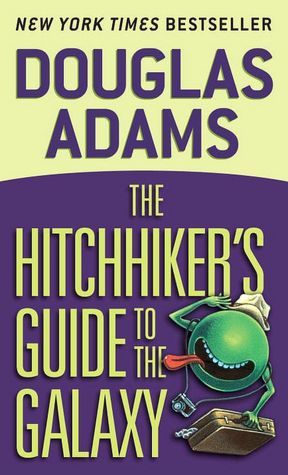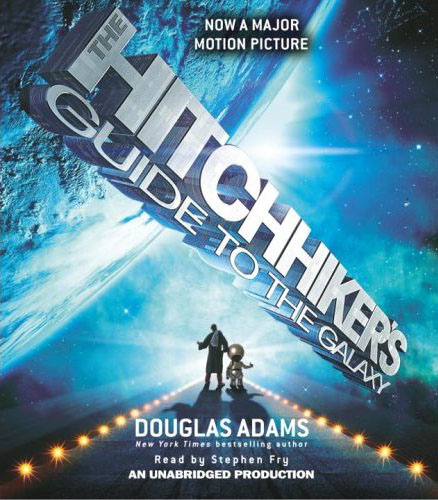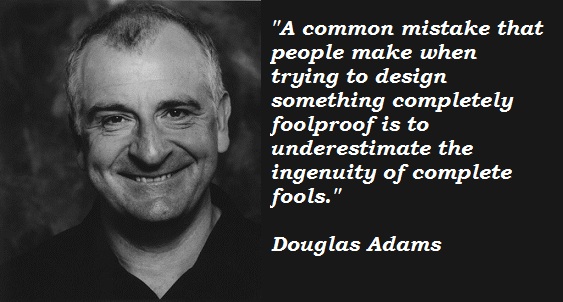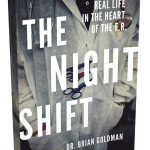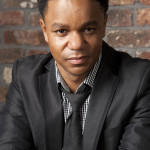“Don’t Panic.”
Seconds before the Earth is demolished to make way for a galactic freeway, Arthur Dent is plucked off the planet by his friend Ford Prefect, a researcher for the revised edition of The Hitchhiker’s Guide to the Galaxy who, for the last fifteen years, has been posing as an out-of-work actor.
Together this dynamic pair begin a journey through space aided by quotes from The Hitchhiker’s Guide (“A towel is about the most massively useful thing an interstellar hitchhiker can have”) and a galaxy-full of fellow travelers: Zaphod Beeblebrox–the two-headed, three-armed ex-hippie and totally out-to-lunch president of the galaxy; Trillian, Zaphod’s girlfriend (formally Tricia McMillan), whom Arthur tried to pick up at a cocktail party once upon a time zone; Marvin, a paranoid, brilliant, and chronically depressed robot; Veet Voojagig, a former graduate student who is obsessed with the disappearance of all the ballpoint pens he bought over the years. [From: Goodreads.com]
“Would it save you a lot of time if I just gave up and went mad now?”
In The Hitchhiker’s Guide to the Galaxy, the characters visit the legendary planet Magrathea, home to the now-collapsed planet-building industry, and meet Slartibartfast, a planetary coastline designer who was responsible for the fjords of Norway. Through archival recordings, he relates the story of a race of hyper-intelligent pan-dimensional beings who built a computer named Deep Thought to calculate the Answer to the Ultimate Question of Life, the Universe, and Everything. When the answer was revealed to be 42, Deep Thought explained that the answer was incomprehensible because the beings didn’t know what they were asking. It went on to predict that another computer, more powerful than itself would be made and designed by it to calculate the question for the answer.
(Later on, referencing this, Adams would create the 42 Puzzle, a puzzle which could be approached in multiple ways, all yielding the answer 42.)
The computer, often mistaken for a planet (because of its size and use of biological components), was the Earth, and was destroyed by Vogons to make way for a hyper spatial express route, five minutes before the conclusion of its 10-million-year program. Two of a race of hyper-intelligent pan-dimensional beings who commissioned the Earth in the first place, disguise themselves as Trillian’s mice, and want to dissect Arthur’s brain to help reconstruct the question, since he was part of the Earth’s matrix moments before it was destroyed, and so he is likely to have part of the question buried in his brain. Trillian is also human but had left Earth six months previously with Zaphod Beeblebrox, President of the Galaxy.
The protagonists escape, setting course for “The Restaurant at the End of the Universe”. The mice, in Arthur’s absence, create a phony question since it is too troublesome for them to wait 10 million years again just to cash in on a lucrative deal. [From: Wikipedia.com]
“Time is an illusion. Lunchtime doubly so.”
If you ever talk about why a funny book is also smart, someone will probably say, “No, it’s just funny, you’re over thinking it.”
That person is wrong – funny books can also be smart.
And – wait for it – we think that Hitchhiker’s Guide is just such a book.
Hitchhiker’s Guide starts with a normal-seeming person—he’s not a hero, he’s not a powerful politician, he’s not a space marine from Halo or other video games. And then the book puts this regular guy in new, weird, gigantic situations. When a construction crew comes to knock down your house, you may know what to do; but what do you do when an alien construction crew comes to knock down your planet? What Arthur Dent learns from all this is that he lives in an absurd universe that doesn’t really care what happens to him. But Hitchhiker’s Guide also shows us how to deal with an absurd universe that doesn’t care about us (also known as high school): no matter how bad things get, you can always laugh.
That’s the connection between the smarts of this book and the funniness of it: Arthur Dent is a small guy dealing with gigantically big issues that he really can’t solve.
(Pop quiz: in a battle between a hitchhiker and the universe, who do you think will win? Hint: it’s the universe.)
But at the very least, he can laugh about it.
Which is super-good for us since we get one of the funniest, most quotable science fiction comedies ever written. Once you read this book, not only will you start to repeat some of these quotes, but you’ll start to see them all over, as if these quotes were hunting you:
“So long and thanks for all the fish,”
“Mostly harmless,”
“Life! Don’t talk to me about life,”
…and the answer to the great question of life, the universe, and everything is… “42.”
[From: Shmoop.com]
“The ships hung in the sky in much the same way that bricks don’t.”
Join Douglas Adams’s hapless hero Arthur Dent as he travels the galaxy with his intrepid pal Ford Prefect, getting into horrible messes and generally wreaking hilarious havoc. Dent is grabbed from Earth moments before a cosmic construction team obliterates the planet to build a freeway. You’ll never read funnier science fiction; Adams is a master of intelligent satire, barbed wit, and comedic dialogue. The Hitchhiker’s Guide is rich in comedic detail and thought-provoking situations and stands up to multiple reads. Required reading for science fiction fans, this book (and its follow-ups) is also sure to please fans of Monty Python, Terry Pratchett’s Discworld series, and British sitcoms. [A Review From: Amazon.com]
“Isn’t it enough to see that a garden is beautiful without having to believe that there are fairies at the bottom of it too?”
If you like this story, CLICK HERE to join the tribe of success-minded people just like you. You will love our weekly quick summaries of top stories, talks, books, movies, music and more with handy downloadable guides, cheat sheets, cliffs notes and quote books.
